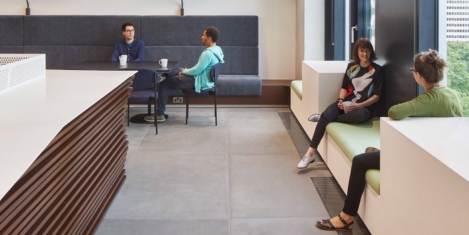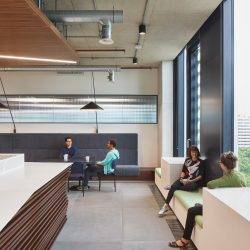March 2, 2018
Productivity, retention and employee wellbeing improve when there is workplace trust

Being in a reliable work environment increases retention, productivity and employee wellbeing, while also promoting a better business culture, finds new research from Bupa. An examination of workplace trust and the impact on employee wellbeing reveals that over half (53 per cent) of employees considered it to be a major factor in whether they stayed or left a company. The research found that nearly a quarter of UK employees (24 per cent) have left their company due to issues around trust. Although trust is not a tangible workplace benefits, such as salary and bonuses, it is an essential variable in promoting harmony and productivity within an organisation and the study suggests how important it is within the workplace, and also the contribution it makes to the wellbeing of employees and the overall performance of a company. The study also asked employees how trust compares to other company benefits. Nearly two thirds (62 per cent) believe that trust is more important than a gym membership or company mobile, while over half value it more than a free canteen (56 per cent) and company car (55 per cent).











 Over a third of UK employees (37 percent) have felt discriminated against in the workplace, more than one in ten (12 percent) believe they have suffered age discrimination and 8 percent feel they’ve been discriminated against due to their gender. This rises to 11 percent amongst women, claims a new study of 1,300 working adults by ADP. The study also suggests that standards and perceptions of behaviour have shifted across the generations, with those in so-called ‘Generation Snowflake’ more sensitive to unfair treatment than their more mature colleagues. According to the findings, half (50 percent) of those under 35 say they have felt discriminated against, compared to just a quarter (26 percent) of those over the age of 45. The contrast is visible across both age (15 percent vs 14 percent), gender (11 percent vs 5 percent) and other types of discrimination.
Over a third of UK employees (37 percent) have felt discriminated against in the workplace, more than one in ten (12 percent) believe they have suffered age discrimination and 8 percent feel they’ve been discriminated against due to their gender. This rises to 11 percent amongst women, claims a new study of 1,300 working adults by ADP. The study also suggests that standards and perceptions of behaviour have shifted across the generations, with those in so-called ‘Generation Snowflake’ more sensitive to unfair treatment than their more mature colleagues. According to the findings, half (50 percent) of those under 35 say they have felt discriminated against, compared to just a quarter (26 percent) of those over the age of 45. The contrast is visible across both age (15 percent vs 14 percent), gender (11 percent vs 5 percent) and other types of discrimination.
 Employers’ efforts in the US to improve staff health and wellbeing are falling short of employees’ expectations, claims a new report. Nearly two-thirds of employees (65 percent) in a report from Willis Towers Watson agree that managing their health is a top priority, but while the majority of employers (56 percent) believe their wellbeing programmes have encouraged employees to live a healthier lifestyle, only 32 percent of employees agree. Eighty-seven percent of employers who participated in the 22nd annual Best Practices in Health Care Employer Survey say increasing employee engagement in health and well-being is a top priority and the research warns that employees in poor health are twice as likely to be disengaged at work and take almost three times as many days off as employees who are in very good health. Employers can improve health behaviour through designing the workplace environment to make it easier for employees to stay fit, eat well, breathe fresh air and address stress adds the report.
Employers’ efforts in the US to improve staff health and wellbeing are falling short of employees’ expectations, claims a new report. Nearly two-thirds of employees (65 percent) in a report from Willis Towers Watson agree that managing their health is a top priority, but while the majority of employers (56 percent) believe their wellbeing programmes have encouraged employees to live a healthier lifestyle, only 32 percent of employees agree. Eighty-seven percent of employers who participated in the 22nd annual Best Practices in Health Care Employer Survey say increasing employee engagement in health and well-being is a top priority and the research warns that employees in poor health are twice as likely to be disengaged at work and take almost three times as many days off as employees who are in very good health. Employers can improve health behaviour through designing the workplace environment to make it easier for employees to stay fit, eat well, breathe fresh air and address stress adds the report.
 In a workplace dominated by insecurity, gig work and intelligent machines we need to improve our understanding of their potential impact on health, safety and wellbeing claims a new report.
In a workplace dominated by insecurity, gig work and intelligent machines we need to improve our understanding of their potential impact on health, safety and wellbeing claims a new report. 
 A new report a new report by the Centre for Ageing Better has called for government and employers to support older workers to stay in work for longer, help those who have fallen out of work involuntarily to return and to create workplaces that work for all, irrespective of age. The report claims that ensuring older workers are able to stay in good quality employment is essential to the future of the UK economy and will relieve pressure on public finances. It makes some key recommendations that include access to flexible working hours and workplace adaptations to help people manage pressures such as caring responsibilities and health conditions, which become more prevalent with age. It also calls for equality of opportunities in the workplace as older workers in the UK experience age discrimination in recruitment and progression. They are less likely to be offered opportunities for development – across the whole of the OECD only Turkey and Slovenia have lower levels of on-the-job training for older workers than the UK. Research shows they are also the most likely to be stuck on low pay and feel most insecure about their jobs.
A new report a new report by the Centre for Ageing Better has called for government and employers to support older workers to stay in work for longer, help those who have fallen out of work involuntarily to return and to create workplaces that work for all, irrespective of age. The report claims that ensuring older workers are able to stay in good quality employment is essential to the future of the UK economy and will relieve pressure on public finances. It makes some key recommendations that include access to flexible working hours and workplace adaptations to help people manage pressures such as caring responsibilities and health conditions, which become more prevalent with age. It also calls for equality of opportunities in the workplace as older workers in the UK experience age discrimination in recruitment and progression. They are less likely to be offered opportunities for development – across the whole of the OECD only Turkey and Slovenia have lower levels of on-the-job training for older workers than the UK. Research shows they are also the most likely to be stuck on low pay and feel most insecure about their jobs.















March 2, 2018
Employment law is out of step with flexible work and the changing workplace
by Leon Deakin • Comment, Flexible working, Legal news, Workplace
(more…)